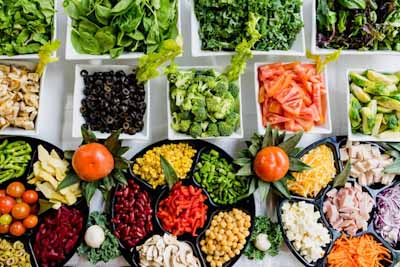Ever wonder why you must include vegetables in your diet? Ever wonder why it is so important to eat many servings of vegetables each day? Then, let us examine what others are doing and what we should do to get the most benefits from vegetables in our diet at each meal.
Are You Eating Enough Vegetables?
Many men and women only eat about half the recommended servings of vegetables daily.
Needless to say, vegetables provide vitamins, minerals, dietary fiber, and many other nutrients naturally present in plants.
Furthermore, most vegetables are lower in calories than many foods and help fill you up to avoid excessive weight gain. Also, you can easily consume all your vegetables as smoothies.
Best Personal Blender
If you want an affordable and powerful personal smoothie blender, click here.
Why Vegetables in the Diet?
Researchers say that diets high in vegetables help protect against chronic diseases, including heart disease, stroke, and some cancers.
Therefore, eating the rainbow is a fundamental healthy eating tip. Additionally, fresh Vegetables provide many health benefits.
So, when you eat more vegetables and fruits as part of your overall healthy diet, you are more likely to have a reduced risk of some chronic diseases.
Seven Reasons Vegetables Are Important
There are many benefits of including vegetables in your diet every day. Some of them are listed below:
- Vegetables provide a quick — natural, and healthy snack.
- They are packed with essential vitamins and minerals.
- Fresh vegetables contain antioxidants that may reduce the risk of some diseases.
- Many vegetables are low in calories.
- Aim for eating a variety of vegetables that are loaded with fiber to help your digestive system.
- Vegetables are very convenient to eat on the go and easy to include in your healthy diet.
- And best of all, vegetables have appealing colors and texture for an added appeal to your plate.
Vegetables to Include in Your Diet
Sulfur-rich foods, like onions, cabbage, and broccoli, offer potent anti-carcinogenic compounds unique to sulfur-containing vegetables.
This type of vegetable is the healthiest and most antioxidant-rich produce. Therefore, it should be at the top of your grocery list every week if you want to optimize your nutrition.
What is a Serving of Vegetables?
By now, you have probably figured out that including vegetables in your daily diet is essential. Moreover, the healthiest ones are better.
Then, let us clarify what a serving of vegetables is. Depending on the kind of vegetable you eat, a serving comes in many varieties.
Let us include a few examples of what is considered one serving of a typical selection of vegetables.
- No more than ½ cup of cooked green or orange vegetables
- One bowl of salad made mainly of green leafy vegetables
- A ½ medium potato or other starchy vegetables
- About ½ cup canned or cooked dried beans, peas, or lentils
Number of Vegetables Servings To Include In Your Diet?
Nutritionists advise including many servings of vegetables in a daily diet. They state that eating at least five servings of vegetables a day is essential to maintaining a healthy lifestyle.
In the table below, we have listed a guideline for vegetable servings per gender and age group.
It is important to note that experts recommend that you consume at least many vegetables to maintain a healthy gut and receive the required nutrients and vitamins.
| Age | Men | Women |
|---|---|---|
| 19-50 Years | 6.0 | 5.0 |
| 51-70 Years | 5.5 | 5.0 |
| 70+ Years | 5.0 | 5.0 |
Buying Healthy Vegetables on a Budget
It is straightforward to include more vegetables in your diet to reap the benefits without spending a fortune at the grocery store. So, here are our five tips for buying important vegetables on a budget
1. look for local grocery store weekly specials:
Download an app to summarize the weekly deals. However, check the Sunday newspaper for coupons and weekly vegetable specials if you are not an app person.
2. buy whole vegetables and chop them yourself:
Buying prepackaged chopped vegetables is convenient but can be costly. So, if you have the time, buy fresh produce and chop it immediately.
Then, you can store it in the fridge for salads or steam it for serving with lunch or dinner for a healthy diet.
3. pack for snack:
Produce in bulk makes a great, cost-efficient snack. It is advisable to package it in servings of vegetables for convenient snacks.
You can enjoy them with your lunch or on the go. Make double the quantity and freeze half for an extra healthy diet dish later!
4. prepare seasonal vegetable servings
Seasonal fresh vegetables are less expensive than those available all year through imports.
So, taking advantage of seasonal produce is cost-effective when planning your daily diet of healthy vegetable meals!
5. freeze your vegetables
Additionally, buying seasonal fresh vegetables and freezing any uneaten portions is a great idea.
Then, the best way to freeze fresh vegetables is by dicing, blanching, and placing them in small containers in the freezer.
Moreover, freshly frozen vegetables are ideal for healthy omelets, chicken dishes, or stir-fry dinners. They are also a healthy choice for hearty stews.
Add More Vegetables for a Healthier Diet
The healthy choice is to prepare your meals, be it casseroles, pasta, or soups, by doubling the servings of veggies and cutting back on the meats.
This strategy helps you reap the benefits of adding more vegetables to your diet while reducing the quantity of meats.
Since seasonal vegetables, beans, and legumes are usually less expensive, adding beans or peanuts to your diet makes for a healthy, low-cost protein.
Looking for the best protein bar to use as a healthy snake? Click here for more details.


